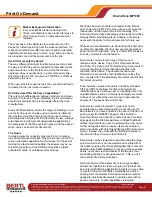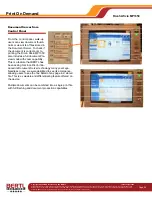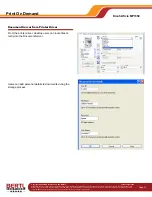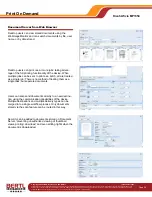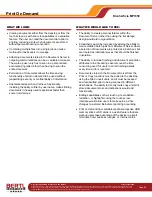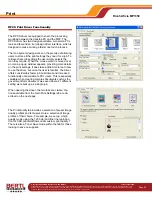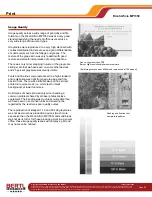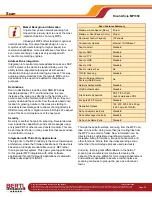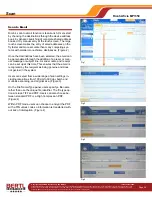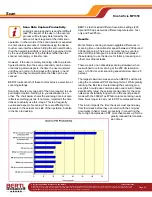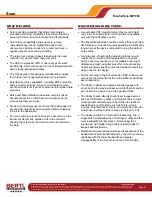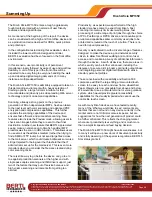
Copyright © 2006 MCA Internet, LLC dba BERTL.
13 November 2006
All Rights Reserved. The license under which this document is made available and applicable law prohibit any reproduction or further transmission of any portion of this document. This
document may only be viewed electronically through the www.BERTL.com Web site and may not be stored in electronic or hard copy format. Any reproduction of trademarks is strictly
prohibited. BERTL accepts no responsibility for any inaccuracies or omissions contained in this document.
Page 38
Ricoh Aficio MP1350
Market Background Information
In just a few years, network scanning has
moved from a luxury item to one of the most
important functions on many MFPs.
Virtually all MFPs offer standard or optional
network scanning. Document feeder design is now a
major focus with users looking for higher speed, low
resolution capabilities, more versatile scan functions, and
even color scanning on devices only equipped with
monochrome marking engines.
Address Book Integration
Integration into central corporate address books on LDAP
or NT servers is the de facto standard today, as is the
ability to force-populate outgoing email with sender
information through an enforced login process. This way,
outgoing communications from the remote MFP can be
traced back to the user and audited for compliance
purposes.
Destinations
Scan-to destinations include email, SMB (Windows
desktop locations), FTP, and Internet fax. In some
instances, the scan goes directly to the hard drive. An
email is sent to the recipient with a URL link so they can
quickly download the scan file from the device hard drive
location. A growing number of devices are starting to
include external media ports to allow scanning directly to
USB memory sticks or digital camera SD chips. We expect
to see this be commonplace over the next year.
Security
Security is another hot point in scanning. Several devices
now include the capability to send scan messages using
encrypted PDF or other secure transfer medium. This can
be an important factor in many industries that are sensitive
to data theft or misuse.
Integration with Third-Party Applications
The big buzz in the MFP industry is the move toward open
architecture, where the firmware backbone of the device is
based on an industry standard like Java or .NET rather
than a proprietary system. This opens great opportunities
for far greater MFP integration with other software
applications through third-party applications created with
software developer kits (SDK).
Through these partnerships, scanning from the MFP can
take on a new life, doing more than just routing files from
the MFP to an email or folder. Now, information can be
directed into a sophisticated workflow complete with
metadata, billing information, image enhancement, and
other functions. All are from the initial scanning action,
rather than the multi-stage process used previously.
Currently, there is great differentiation in the field of
scanning as manufacturers continue to develop this
aspect of the device. Watch for more image enhancement
and workflow capabilities to become commonplace as
scanning continues to pick up the pace as a dominant
factor.
Scan Features Summary
Maximum Scan Speed (Mono)
80-ipm
Maximum, Scan Speed (Color)
80-ipm
Document Feeder Capacity
100 sheets
Connectivity Options
Ethernet 10/100BaseT
Scan to email
Standard
Scan to SMB
Standard
Scan to FTP
Standard
Scan to HDD
Standard
Scan to URL
Standard
Scan to Internet Fax
No
TWAIN Scanning
Standard
Scan to External Memory
Source (USB/SD card)
No
Network Authentication
Standard
LDAP Authentication
Standard
File Formats Supported
PDF, TIFF, JPEG,
High Compression PDF
Encrypted PDF Format
Standard
Resolution Options
100, 200, 300, 400, 600 dpi
(1,200 dpi with TWAIN)
Ad hoc Subject Line Entry
Standard
Ad hoc Message Line Entry
Standard
Ad hoc File Name Entry
Standard
Scan


